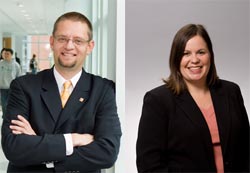Sports research center examines the impact of green teams
The Philadelphia Eagles have been called the NFL’s greenest team for sustainability efforts ranging from tree-planting initiatives to an employee-reimbursement program that promotes the use of wind energy.
The team has also announced plans to use solar power, wind turbines and biodiesel or natural gas to transform Lincoln Financial Field into one of — if not the most — environmentally friendly stadiums in the world.
As all industries, including sport organizations, further integrate environmental efforts into their business models, academic research is increasingly monitoring the effectiveness of teams’ corporate social responsibility and sustainability initiatives.
Scholars at Temple University’s Sport Industry Research Center (SIRC) are testing the widely held proposition that sport organizations, because of their diverse fan bases and far-reaching messaging, can create more positive social change.
Their research has found that corporate social responsibility can strongly influence a team’s reputation and image, which can translate to positive word of mouth among fans and increased willingness to buy tickets or merchandise.
But if the Phillies’ grounds crew uses only organic fertilizers, or if the Eagles replace millions of plastic cups with those made from corn-based material, will it change fan behavior? Not so much.
“It’s not getting there,” said SIRC Director Aubrey Kent. “Because my favorite team really believes in recycling isn’t going to make me more or less likely to recycle. It really depends on my internal values about that.”
In addition to researching the effectiveness of the Phillies’ and Eagles’ environmental programs — a project being led by Ph.D. candidate Yuhei Inoue — Assistant Professor of Sport and Recreation Management Emily Sparvero is examining the impact of the Olympic Games on host communities.
The International Olympic Committee cites sport, culture and the environment as the three fundamental dimensions of Olympism, and prospective host cities must demonstrate how they will be environmentally sustainable in preparing for and hosting the games.
But Sparvero has found reports of destruction of habitats or builders bypassing regulations established to ensure the Olympics are environmentally friendly. Academic research, Sparvero said, can highlight “the good communities are doing and also the things that are counterintuitive or unproductive in terms of hosting environmentally sustainable events.”
To Sparvero — whose work was honored last year with an International Sport Management Conference Young Investigator Scholarship — research can also help debunk common sports myths.
“There are a lot of things that we claim about sport that get repeated over and over, but there’s not the evidence to either support or refute it unless we have more academic research coming out,” she said.
